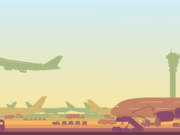MELBOURNE, Australia ─ The United Nations World Food Programme (WFP) has partnered with Flight Safety Foundation’s Basic Aviation Risk Standard (BARS) Program to support health and humanitarian partners responding to COVID-19 and ongoing humanitarian crises around the world.
Prior to the pandemic, around 50 percent of food and aid cargo was carried on commercial passenger flights. Between April and June 2020, international flights dropped by 92 percent, the largest air passenger capacity drop in years, challenging health and humanitarian organizations’ ability to deliver critical supplies to countries in need.
To ensure uninterrupted movement of humanitarian workers and cargo, WFP stepped up to support the global COVID-19 response by leveraging its logistics capacity and expertise to fill gaps created by the reduction in the commercial availability, and transport health and humanitarian cargo and workers to the frontlines of the pandemic. WFP’s mandated United Nations Humanitarian Air Service (UNHAS) operations continue to serve the humanitarian and development communities covering 22 countries
.
Chief of WFP Aviation Safety Unit Mario Sibrian said WFP Aviation remains a lifeline service to transport humanitarian passengers.
“WFP air passenger services have been a vital link for humanitarians and health workers trying to reach the pandemic response frontline,” Sibrian said.
Flight Safety Foundation President and CEO Dr. Hassan Shahidi said the organization is ready to aid WFP. “We are proud to be partnering with WFP on Program-Connect and are pleased that we can support WFP’s vital mission, particularly during such turbulent times,” he said. “The Foundation values its long relationship with WFP and we stand ready to aid WFP as it responds to the COVID-19 pandemic in any way we can.”
Under the Program-Connect Initiative, BARS’s more than 120 Registered Aircraft Operators can be evaluated against the United Nations Aviation Standards’ WFP requirements and are eligible to join the WFP’s Registered Aircraft Operators. The initiative will connect WFP with reliable aviation partners around the world and eliminate overlaps between the WFP and BARS risk evaluation systems.
BARS Program Managing Director David Anderson said Program-Connect is the first initiative of its kind in the contract aviation industry.
“We are extremely proud to extend the benefits of the BARS Program to support the important work conducted by the WFP and provide a recognized structure to evaluate the safety of potential humanitarian flight contractors,” Anderson said. “Program-Connect will expand WFP’s global network and mobilize our already existing network of operators in 28 countries, including those in Africa, the Middle East, Asia and South America.”
According to Anderson, the downward trend in contract aviation accidents in the onshore resource sector correlates with the growth of the BARS Program.
“As Program-Connect encourages aircraft operators to implement rigorous risk management and safety assurance, we are confident the downward trend in the onshore resource sector will be replicated in the humanitarian industry despite the increased need for aid.”
###
About Flight Safety Foundation and the Basic Aviation Risk Standard (BARS) Program
FSF is an independent, international and impartial nonprofit that exists to champion the cause of aviation safety. The Foundation established the Basic Aviation Risk Standard (BARS) Program in 2010 to review aviation operators providing aviation services to the resources and other sectors. The BARS Program is made up of a suite of risk-based aviation industry standards with supporting implementation guidelines.
The BARS Program has operated for 10 years, with more than 757 audits in 37 different countries for more than 212 aircraft operators. As a result, about 214,357 questions have been asked as part of our structured audits, identifying some 15,359 non-conformities. Find out more about FSF at their website: www.flightsafety.org.
About the World Food Programme
The United Nations World Food Programme is the 2020 Nobel Peace Prize Laureate. We are the world’s largest humanitarian organization, saving lives in emergencies and using food assistance to build a pathway to peace, stability and prosperity for people recovering from conflict, disasters and the impact of climate change.
Media Contacts:
Kate Cullen
Cole Lawson Communications
+61 7 3221 2220
kate.cullen@colelawson.com.au
Frank Jackman
Vice President, Communications
+1 703.739.6700, ext. 116
jackman@flightsafety.org


